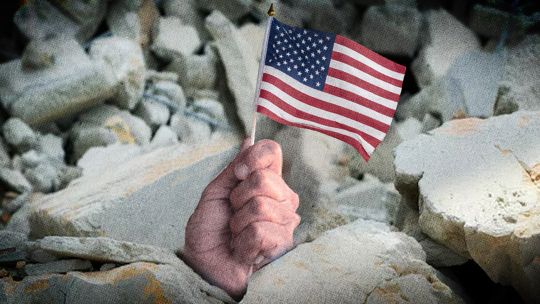
Until US President Donald Trump and his Treasury Secretary Scott Bessent intervened, Argentina was in a death spiral that, had it continued for much longer, would in all probability have had quite devastating consequences for millions of people. As Adam Smith once said, “there is a great deal of ruin in a nation” – by which he meant that utterly bankrupting one could take far longer than many supposed – but Argentina did seem to be fast approaching the end of a road already travelled by Venezuela.
It certainly looked as though President Javier Milei’s dithering government had lost its grip on events and that was why the peso was losing value by the minute, reserves were dwindling at an alarming rate and – to the explicit delight of Cristina Fernández de Kirchner – yet another default seemed all but inevitable. But then, like dei ex machina, two of the world’s most powerful men decided to step in and save the country from the unhappy fate it was plunging towards.
They had good reasons for doing so: they understood that Milei’s downfall and the mere possibility that Argentina could revert to a turbo-charged version of Kirchnerite populism would be bad for the United States by depriving her of a “systemic ally” in Latin America and also for the inchoate, but increasingly influential, international movement that Trump is leading in which Milei plays an active role. The Republican Party leader must also have enjoyed reminding the world that he could be as kind to his personal friends as he is brutal towards his enemies.
After Bessent told the markets that the US administration would do whatever it took to prevent Argentina from going broke, the market mayhem suddenly came to a stop, with the main indicators going back to where they had been before it looked as though Milei would be hard put to survive for much longer in office. Does this mean that from now on it will be plain sailing for the chainsaw man? Of course not. While Milei has been remarkably successful when it comes to buttering up the current occupant of the White House who revels in the adulation that comes with his job, he will still have to win over many compatriots who, of late, have been rather more impressed by his numerous defects than by his merits.
Much will depend on what, if anything, Milei has learned from the events of the last few weeks. Saving the country from the hyperinflationary maelstrom that threatened to engulf it before he became president allowed him to enjoy a prolonged honeymoon with the electorate, but as people started taking for granted what, by Argentine standards, had become a modest monthly increase in the cost of living, they began to pay more attention to other matters, such as the difficulties faced by businesses of all kinds and, what proved equally damaging, persuasive rumours that members of the government, including Milei’s sister and Presidential Chief-of-Staff Karina, were raking in bribes from pharmaceutical companies and playing dodgy games with cryptocurrencies. It is also worth taking into account the sour mood spreading among politicians and journalists who decided they could no longer put up with his thoroughly unpleasant treatment of all those who dared to question, no matter how timidly, any of his policies.
By in effect offering to bankroll him for a while, Trump provided Milei with a chance to reform both himself and his government. Will he take it? As the “anarcho-capitalist” libertarian is evidently reluctant to mend his ways, he could well see Trump’s quite remarkable willingness to give him his “total support” and help him get re-elected in 2027 as a sign that he did not need to change his behaviour.
That would be a serious mistake. For a monetarist like Milei, fighting inflation was a relatively straightforward business, but the same cannot be said about what will have to be done to turn Argentina into the prosperous and dynamic country he publically dreams about. For that to happen, the government will have to whip up what John Maynard Keynes – an economist he loathes – called the “animal spirits” of the population. And, as a keen believer in private enterprise, Milei could try to convince people that their future will depend in large measure on their own efforts and not on the benevolence of politicians, a notion that, for obvious reasons, is anathema to the many who want them to believe otherwise.
Milei’s enemies have made much of his unwillingness to empathise with those who are doing badly. They say he is by nature a cruel man who wants others to suffer. For almost two years, this sort of thing did not hurt him – most people appeared to have come to the conclusion that smarmy politicians who say they feel your pain, are self-seeking hypocrites – but it would seem that, since the local elections in Buenos Aires Province, this is no longer the case and that, as in so many parts of the world, politicians can win votes by pretending that, thanks to their humanitarian sentiments, they are capable of solving the personal problems of those who are willing to trust them.
The Kirchnerites and their fellow-travellers are well aware that Milei’s popularity was due almost entirely to the belief that he knew just what had to be done to repair Argentina’s crumbling economy and that, unlike others who had similar ideas, he would not flinch from doing whatever was needed even if it upset a great many people. Encouraged by what happened in the Buenos Aires Province elections, Cristina and her many allies take it for granted that the best way to regain power and free her from house arrest and that infuriating electronic anklet would be for them to harm Milei by wrecking the economy. Until Trump and Bessent called a halt, they were well on the way to achieving their aim.
The thought that their own supporters would be among the hardest-hit victims of the meltdown they had in mind did not worry them in the slightest. Why should it? The election results confirmed what they have always known; people who have been condemned to extreme poverty are the most loyal supporters of the political movement that contributed so much to their misfortunes. As a general rule, the poorest and most ignorant inhabitants of the worst parts of the crime-ridden Buenos Aires slum belt can be relied upon to vote for the people who have ruled their districts for decades, so it is in the interest of staunch Peronists to ensure that they remain that as they are. From the point of view of Cristina and her friends, as well as of Axel Kiciloff, the old Bolshevik slogan according to which the worse things get the better it will be for the comrades really does make good sense, which is why they would dearly like to see the country crash into the ground. After all, in such an event, Milei would be buried under the rubble.
related news





